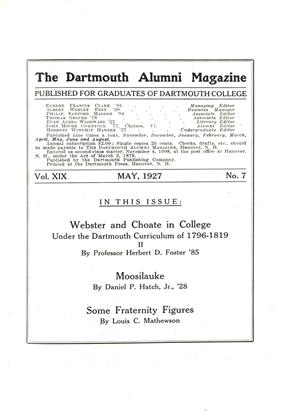The recent proposals of President Ernest M. Hopkins for the reform of football have been widely discussed and commented upon as it was his hope that they would be. From among the dozens of editorials provoked by his letter to the President of the Dartmouth Athletic Council the ALUMNI MAGAZINE has chosen to reprint the following as representative of the views expressed:
(From The New York Times) Proposals for "reforming" intercollegiate football may seem to some much like projects, for perpetual motion; but the plan of such a man as President Hopkins of Dartmouth, a strong friend of athletics and sometime athletic graduate manager at Hanover, cannot but receive respectful attention. Believing in the value of football, he does "not want to see it exalted to its ruin by uncomprehensing forces outside the college life, nor to see it stifled to death by exasperated forces within." The uncomprehending outlanders must be the graduates. The exasperated forces within are the Faculty. The undergraduates, imagined to: be incapable of interest in anything but football in its season, have to be reformed as well as the graduates. That would require a long campaign of education.
Meanwhile, there is a want of agreement as to facts. Dean Fine of Princeton, acting head of the Board of Athletic Control, says "we never did believe in this overemphasis business down here." Professor Williamson, Faculty Manager of Athletics at City College, is of the same opinion. There have been so many utterances of the dons bewailing the evils of intercollegiate football carried almost to the point of religious frenzy that a general sympathy with Dr. Hopkins's views in the large may be expected in the majority of Eastern colleges. His suggestion that a conference of colleges and universities be called to consider football "reform," deserves to be acted on. Discussion might produce some practicable results; but colleges are kittle cattle and hard to herd.
President Hopkins's specific proposals are limitation of membership on intercollegiate football teams to sophomores and juniors; two major elevens in each college, one to play on the home field and the other on the field of the adversaries ; only undergraduate coaches—seniors, consoled for their exclusion from games by the glory of instructing their successors. This last arrangement looks somewhat fanciful and overrefined. How can there be two major teams; and wouldn't the exo-athletic heroes have the major glory? The two years' restriction is for the purpose of enlarging the number of players. Even SQ, the distribution of benefits wouldn't be great, whereas the forced retirement of trained and exceptionally skillful players would be resented not only by the comparatively negligible undergraduates, but by the inexorable graduates, the chaps who "run" the colleges, if we understand contemporary academic procedure and government.
These are lay thoughts that shouldn't be obtruded. The layman may be justified in saying, though, that perhaps too much pother has been made about the growth, expense, ferocious ardor of intercollegiate football. These are not disproportionate to the immense increase of college wealth and population. There must be a physical limit, sometime, to football expansion. For the present, the adjuration rings in the ears of. the colleges: "Tear down thy Bowl and greater build!" In the amazing diversification of undergraduate interests, it is queer if football remains the burning hallucination that mainly diverts youth from its studies. If it; does, why not reform the colleges instead of football ? Put up your standards and put out the obsessed incapables! Then, we are told, there is too much "publicity" about the games; and yet we want our colleges to be thoroughly American. So they are, too, however much we may regret it, in their savage competitive spirit and mania to win. Perhaps it is the United States that ought to be reformed.
 View Full Issue
View Full Issue
More From This Issue
-
 Article
ArticleWEBSTER AND CHOATE IN COLLEGE
May 1927 By Herbert Darling Foster '85 -
 Article
ArticleTHE UNDERGRADUATE CHAIR
May 1927 -
 Article
ArticleMOOSILAUKE
May 1927 By Daniel P. Hatch, Jr. '28 -
 Article
ArticleSOME FRATERNITY FIGURES
May 1927 By Louis C. Mathewson -
 Article
ArticleDARTMOUTH STUDENTS SAID TO BE IRRELIGIOUS
May 1927 -
 Class Notes
Class NotesClass of 1921
May 1927 By Herrick Brown
Article
-
 Article
ArticleOldest Alumnus
May 1948 -
 Article
ArticleClub Officers Meet
NOVEMBER 1963 -
 Article
ArticleA Horrid Wilderness?
November 1968 -
 Article
ArticleTHE OLCOTT-LEEDS HOUSE
January, 1914 By Charles Frederick Bradley, '73 -
 Article
ArticleSarasota
FEBRUARY 1968 By GILBERT H. ROBINSON '26 -
 Article
ArticleThe Colonel and His Kids
SEPTEMBER 1990 By Jim Perkins '55


